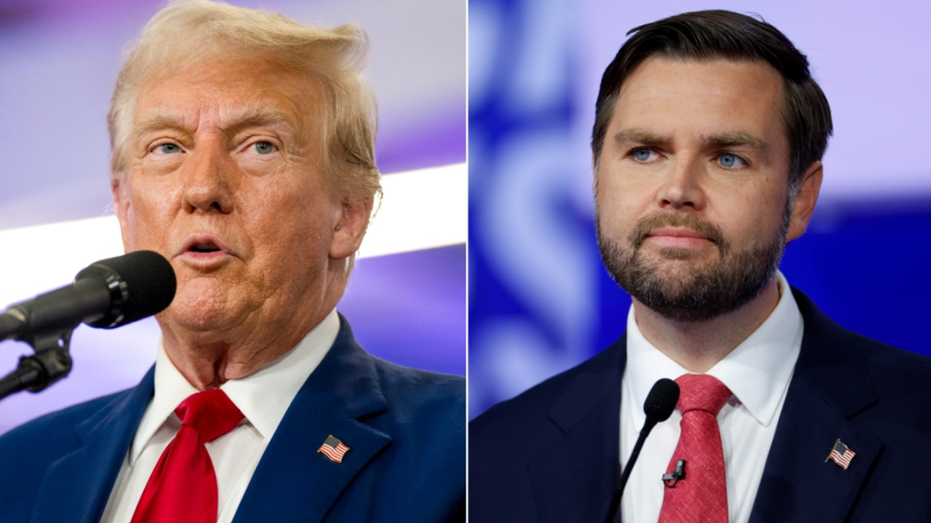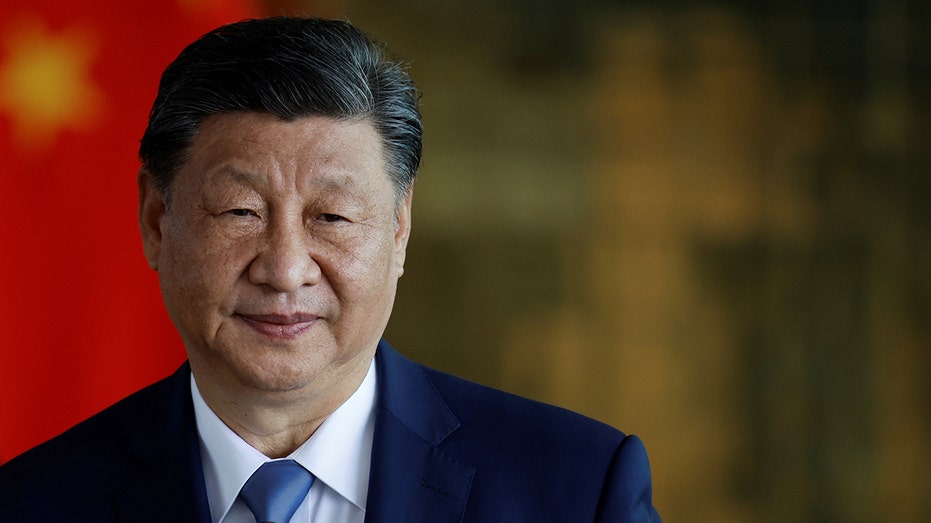Potential Vance Senate replacement travels to Mar-a-Lago as speculation on filling seat intensifies

One of the leading candidates to fill Vice President-elect JD Vance‘s Ohio Senate seat recently traveled to President-elect Trump’s Mar-a-Lago residence as a decision from the state’s governor draws closer. Ohio Gov. Mike DeWine traveled to Trump’s Florida home with fellow Republican Lt. Gov. Jon Husted, who is believed to be a top candidate to replace Vance, in recent days, although the specifics of any conversation are unclear, News 5 Cleveland first reported, and Fox News Digital has confirmed. State law dictates that DeWine will select a Republican to take Vance’s spot in the Senate until a special election is held in November 2026 to determine who will serve the rest of Vance’s term, which ends in 2028. The winner of that special election could then run again in 2028 in order to start a new six-year term. Multiple sources told Fox News Digital that a final decision on the Senate appointment is expected in the next few weeks as the new Congress will be sworn in on Jan. 3. JD VANCE CRITICIZES NY TIMES READER FOR ‘WHINING’ ABOUT ELDERLY NEIGHBOR’S PRAYERS: ‘STOP BEING A WEIRDO’ DeWine’s office did not immediately respond to a request for comment from Fox News Digital. The Governor’s spokesperson, Dan Tierney, told Fox News Digital last month that DeWine will be looking for a “workhorse” who is “qualified and ready to earn the trust of Ohio voters for another term.” VANCE WILL LIKELY BE 2028 FRONT-RUNNER, BUT RNC CHAIR ‘EXCITED ABOUT THE BENCH THAT WE HAVE’ Fox News Digital previously reported that DeWine is considering, along with Husted, several candidates for Senate, including attorney Mehek Cooke, Ohio’s Republican Secretary of State Frank LaRose, former Ohio GOP Chair Jane Timken, Rep. Mike Carey and others. “Governor DeWine has a crucial decision ahead in selecting Ohio’s next Senator,” Cooke told Fox News Digital on Friday night. “If Jon is the workhorse he picks, he is the right choice.” “He’s battle-tested, with decades of experience fighting for Ohioans and securing a stronger future for our state. If Jon is the pick, I’m 100% behind him—there’s too much at stake, and we need someone who will put Ohio first. It was an honor to interview with the Governor, and he knows my commitment is to always put Ohio’s interests first.” An endorsement from Trump and Vance will be critical for any DeWine appointment, given that both are popular in the Buckeye State, where their ticket won by 11 points in November. Husted, who is believed to be the only Senate candidate to travel to Trump’s home, has served as Ohio’s lieutenant governor since 2019 after serving eight years as Secretary of State and a member of both the state Senate and Ohio House of Representatives before that. Husted has widely been expected to run for governor to replace DeWine, and his team has recently taken steps to allocate resources to that race. Sources tell Fox News Digital that former presidential candidate Vivek Ramawamy’s interest in running for governor has caused some potential gubernatorial candidates to re-evaluate their options, given Ramaswamy’s deep pockets. Husted has remained tight-lipped about the potential Senate appointment other than to say, “I will continue serving this state as long as the people of Ohio will have me. As for the future, I intend to make my plans known early next year.” Fox News Digital reached out to the Trump transition team for comment but did not immediately receive a response.
New report warns of growing national security threat to U.S. as China builds AI: ‘Significant and concerning’

FIRST ON FOX: A pro-tech advocacy group has released a new report warning of the growing threat posed by China’s artificial intelligence technology and its open-source approach that could threaten the national and economic security of the United States. The report, published by American Edge Project, states that “China is rapidly advancing its own open-source ecosystem as an alternative to American technology and using it as a Trojan horse to implant its CCP values into global infrastructure.” “Their progress is both significant and concerning: Chinese-developed open-source AI tools are already outperforming Western models on key benchmarks, while operating at dramatically lower costs, accelerating global adoption. Through its Belt and Road Initiative (BRI), which spans more than 155 countries on four continents, and its Digital Silk Road (DSR), China is exporting its technology worldwide, fostering increased global dependence, undermining democratic norms, and threatening U.S. leadership and global security.” The report outlines how Chinese AI models censor historical events that could paint China in a bad light, deny or minimize human rights abuses, and filter criticism of Chinese political leaders. CATE BLANCHETT WORRIES AI COULD ‘TOTALLY REPLACE ANYONE’ “China is executing an ambitious $1.4 trillion plan to dominate global technology by 2030, with open-source systems as the cornerstone of its AI strategy,” the report states. “While many Western companies focus on paid, proprietary AI models, China is aggressively promoting free and low-cost alternatives to drive rapid global adoption.” The report continues, “By making much of its AI technology freely accessible, Beijing aims to ensure its systems and standards become embedded in the world’s financial, manufacturing and communications backbone. Through coordinated action between government and industry, China is working to reshape the global technology landscape while programming CCP values and control mechanisms into critical systems worldwide.” CHINA’S SCI-FI SPHERICAL DEATH STAR-LIKE ROBOT COP USES AI, FACIAL RECOGNITION TO TRACK CRIMINALS The report explains that China is “racing” to deploy AI while the United States is bogged down on prioritizing AI regulation. “While American and European governments focus on regulating AI, China is aggressively pushing its AI systems into global markets,” the report states, adding that, “This playbook mirrors China’s successful strategy with 5G technology, where Huawei gained dominant market share through aggressive pricing and rapid deployment before Western nations could respond effectively. Now in AI, one Chinese firm alone, Alibaba Cloud, has released over 100 open-source models in 29 different languages, flooding global markets while Western companies must navigate increasingly complex regulatory requirements.” The report lays out the differences between China and U.S. AI model responses and provides policy recommendations to “preserve U.S. AI leadership,” which includes seizing the “historic opportunity to secure lasting American AI leadership” and avoiding “unilateral restrictions on exporting and access to U.S. AI systems. “If America loses the global race to dominate both open-source and closed-source AI technology, authoritarian Chinese systems will write the future, and Washington policymakers can’t let that happen,” Doug Kelly, CEO of the American Edge Project, told Fox News Digital. The report concludes that “the implications of Chinese leadership in global AI development are profound.” “A world of unchecked, Beijing-built AI ecosystems would be a major blow to the U.S. and to humanity writ large,” the Center for New American Security says in the report. “If Chinese AI goes global, so too will brazen non-compliance with international agreements on the technology.”
Why did PM Modi meet 101-year-old ex-IFS officer in Kuwait? Know all about him

The meeting was made possible after Handa’s granddaughter, Shreya Juneja, requested the Prime Minister through a heartfelt social media post
Channelising love, compassion for wildlife: Anant Ambani’s Vantara presents Vantarian Rescue Rangers

Vantara, the wildlife rescue and rehabilitation organisation founded by visionary philanthropist Anant Ambani, is set to captivate and inspire young minds and their families with its latest initiative, Vantarian Rescue Rangers, at the Hamleys Wonderland Carnival in Mumbai till 30th December 2024.
Pakistan jails 25 Imran Khan supporters over attacks on military sites

Military court convicts civilians involved in 2023 unrest, with rights groups slamming ruling as ‘intimidation tactic’. Pakistan has jailed 25 civilians over attacks on military facilities that followed the arrest of former Prime Minister Imran Khan in 2023. The military’s public relations wing confirmed the ruling on Saturday, stating that a military court had handed down sentences of between two and 10 years of “rigorous imprisonment”, with 14 facing a decade behind bars. The statement did not specify the charges, but referred to acts committed by Khan’s supporters, who stormed military premises and torched a general’s house during the unrest in May 2023, as “political terrorism”. It said the ruling was “a stark reminder … to never take law in [one’s] own hands”. The military said others charged over the violence, which killed at least eight people, were being tried in anti-terrorism courts and justice would only be fully served when the “mastermind and planners” were punished. Amnesty International called the ruling “an intimidation tactic, designed to crack down on dissent”. Politically motivated Former cricket star Khan served as prime minister from 2018 to 2022, when he was removed by parliament in a no-confidence vote, blaming the then-head of the powerful military establishment for his downfall. Advertisement The 72-year-old was imprisoned for days in May 2023, then again three months later and has remained in jail since, facing a parade of court cases he claims are politically motivated. Meanwhile, his Pakistan Tehreek-e-Insaf (PTI) party was hit by a sweeping crackdown, with thousands of grassroots supporters and senior officials arrested. Khan was barred from running in elections in February of this year, which were marred by rigging allegations. PTI defied the crackdown to win more seats than any other party but was shut out of power by a coalition of parties considered more amenable to military influence. Last month, protests and unrest gripped the capital Islamabad again as thousands of PTI supporters attempted to occupy a public square on the doorstep of parliament. Saturday’s ruling came days after Khan was indicted by an anti-terrorism court on charges of inciting attacks against the military. Adblock test (Why?)
Governments and banks once mocked Bitcoin. Now they want in on it

Bitcoin has proven to be one of the best-performing assets in modern history. The value of the cryptocurrency has increased some 1,000 times over the past decade, far outpacing US stocks and real estate. Buoyed by United States President-elect Donald Trump’s crypto-friendly stance, Bitcoin’s record rally hit a new high of $107,000 on Monday after the Republican reiterated his intention to create a Bitcoin strategic reserve. Bitcoin, the first decentralised digital currency, was invented by the pseudonymous figure Satoshi Nakamoto in the wake of the 2007-2008 global financial crisis. Nakamoto introduced the blockchain system – a digital ledger that stores transactions in a network of computers – to enable anyone to make financial transactions without the involvement of banks, financial firms or governments. Once widely derided as a speculative asset with no intrinsic value, Bitcoin is being taken increasingly seriously by governments, financial institutions and investors alike. Boaz Sobrado, a London-based fintech analyst, said Bitcoin has transformed from being a niche asset favoured by political dissidents and criminals carrying out Illicit transactions “to something that central banks have to keep in mind and consider”. Advertisement “The IMF has put very firm anti-crypto political guidelines into place when negotiating with countries that might require its own assistance. It’s gone from being an academic question to a practical, real one and one that central banks are taking very seriously now,” Sobrado told Al Jazeera. Bitcoin’s record rally hit a new high of $107,000 this month [Nicolas Tucat/AFP] In January, the US Securities and Exchange Commission (SEC) approved Bitcoin ETFs (exchange-traded funds), allowing investors to have exposure to the asset on the stock exchange for the first time. In an October report, the US Department of the Treasury referred to Bitcoin as “digital gold”, noting its use as a store of value. A number of countries have made big bets on the cryptocurrency. El Salvador has accumulated some $600m worth of Bitcoin reserves and is one of just a handful of countries, along with the Central African Republic, that accepts the asset as legal tender. Other countries, including the US and the United Kingdom, have acquired large holdings of Bitcoin through the seizure of assets implicated in criminal activity. The US has seized at least 215,000 Bitcoins, valued at almost $21bn at current prices, since 2020, according to an analysis by crypto firm 21.co. With Trump returning to the White House, Bitcoin supporters are hopeful that cryptocurrencies will gain unprecedented legitimacy after years of government-led crackdowns on the sector. Despite once labelling Bitcoin “a scam”, Trump has emerged as arguably the world’s most powerful advocate for the asset. Donald Trump gives a keynote speech at the Bitcoin 2024 conference in Nashville, Tennessee [File: Jon Cherry/Getty Images/AFP] After pledging to make the US “crypto capital of the planet”, he has picked several high-profile crypto enthusiasts to join his incoming administration, including former PayPal Chief Operating Officer David Sacks as crypto tsar and Paul Atkins as SEC chair. Advertisement Trump’s pro-crypto stance has found allies in the US Congress, such as Senator Cynthia Lummis, a Republican from Wyoming, who earlier this year introduced the BITCOIN Act of 2024, which would include Bitcoin among reserve assets such as gold and oil as a long-term store of value. Under Lummis’s plans, the government would buy roughly 200,000 Bitcoins every year for five years, and then hold the assets for 20 years as a hedge against inflation. “If we did that with five percent of all the Bitcoin that will ever exist – which is roughly a million Bitcoin – we could cut our debt in half in 20 years,” Lummis said in a television interview with Fox Business. On Wall Street, derision and mockery have also given way to more positive appraisals. BlackRock CEO Larry Fink, who once described Bitcoin as an “index of money laundering”, in January said the commodity was “no different than what gold represented for thousands of years” and an “asset class that protects you”. ‘Currency of resistance’ The key attribute of Bitcoin that makes it revolutionary is that it separates money from the state, according to Max Keiser, senior Bitcoin adviser to El Salvador President Nayib Bukele. “This is the first time in history that this has ever happened – money exists that has no central authority controlling it. This is what makes it unique, very powerful,” Keiser told Al Jazeera. “There’s now this growing feeling that the 21st century will be the century of Bitcoin.” Keiser spotted Bitcoin’s potential early on and advised people to buy it when its value was only $1 in 2011. That year, he and his wife, television presenter Stacy Herbert, called Bitcoin “the currency of resistance”, and predicted it would top $100,000. Advertisement One of the reasons Bitcoin has gained strength in value is the poor performance of economies such as Argentina, where inflation last year skyrocketed more than 200 percent, according to Gerald Celente, founder and director of the New York-based Trends Research Institute. “People were seeing their currencies being devalued… People were saying: ‘I’m losing all my money, what am I going to do?’ They can’t afford to buy gold, so they started buying whatever they could in cryptocurrencies like Bitcoin, so that kept it strong,” Celente told Al Jazeera. Since Trump’s election, Bitcoin’s price has risen by more than 50 percent and with an incoming pro-crypto administration, Celente predicts an even greater rally. “[The value] could go through the roof, but we don’t see [Bitcoin] going down much at all,” he said. Crypto supporters argue that Bitcoin’s winning advantage is that its global supply is capped at 21 million. Unlike central banks that can print money indefinitely, Bitcoin’s supply stays constant no matter the demand, which has helped boost its value against the dollar. Armando Pantoja, futurist and tech investor, believes that Bitcoin will appreciate in value “forever”, likening the purchase of the asset to buying real estate in Manhattan. “Bitcoin has value not because of the currency, but because of the technology
Trump and the return of the National ‘Emergy’

In October 2018, a “migrant caravan” bound for the United States set out on foot from Honduras. The group was comprised of refuge seekers of all ages fleeing contexts of acute violence and poverty – a regional reality shaped by decades of punitive foreign policy machinations by none other than the US itself. Then-president Donald Trump, never one to pass up an opportunity for overzealous xenophobic spectacle, took to Twitter to broadcast a “National Emergy” [sic], warning that “criminals and unknown Middle Easterners are mixed in” with the caravan. In preparation for the pedestrian assault on the country, Trump ordered 5,200 active-duty US military troops to be deployed to the southern border along with helicopters, heaps of razor wire, and other “emergy” equipment. Obviously, the US lived to tell the tale – although the same cannot be said for the thousands of refuge seekers who have died over the years while attempting to reach perceived safety in the country. Now, as Trump gears up for his second round as commander in chief of the nation, we’re in for another round of the anti-migrant “emergy”, as well, which the president-elect has taken the liberty of preemptively declaring. Advertisement After campaigning on a pledge to perpetrate the “largest deportation operation” in US history, Trump in November confirmed he was “prepared” to declare a national emergency and to utilise the US military to expel millions of undocumented immigrants from the country. The deployment of the armed forces in this particular task naturally leaves no room for doubt that this is, well, war – never mind Trump’s marketed image as a leader who is somehow antiwar. Not that the US war on asylum seekers is anything new. Nor, of course, is it a war that is waged solely by Trumpites and members of the Republican party. Outgoing US President Joe Biden, for his part, did a fine job on the battlefield, overseeing more than 142,000 deportations in fiscal year 2023 alone. Then there was that decision by the Biden administration to waive a whole bunch of federal laws and regulations in order to expand Trump’s beloved border wall, in contravention of Biden’s own promises. Rather than do all the dirty work himself, Biden increasingly enlisted the help of the Mexican government, already an established collaborator in making life hell for the US-bound have-nots of the world. And the more the US forced Mexico to crack down on migration, the more existentially perilous it became for people on the move – and the more profitable for extortion-addicted Mexican authorities and organised crime outfits alike. After all, “border security” is big business on both sides of the border. And on the US side, it’s an entirely bipartisan affair that only becomes more transparently nefariously bonkers when Trump is at the helm; recall, for example, the man’s reported vision in 2019 of a US-Mexico frontier that included a “water-filled trench, stocked with snakes or alligators” and a wall with “spikes on top that could pierce human flesh”. And while the alligators have yet to pan out, it seems that dying in a fire in a Mexican migrant detention centre or succumbing to dehydration and heatstroke in the desert is probably horrifyingly painful enough. Advertisement Meanwhile, the Trumpian fantasy according to which Biden recklessly presided over a free-for-all open-border policy will now only provide additional fuel for Trump’s renewed war effort on the southern border. Like Trump, Biden imposed his own de facto asylum bans that violated both US and international law – and, as Trump launches the second instalment of his quest to “make American great again”, you can bet the human right to asylum is going to come under progressively deranged fire. And yet National Emergy 2.0 is not just a war on refuge seekers. Paradoxically, it’s also a war on the US itself, which cannot exist in its current form without the assistance of mass undocumented labour – the very folks Trump is threatening with the “largest deportation operation” in US history. As per a report by the US Chamber of Commerce, the United States is suffering from a pronounced labour shortage: “If every unemployed person in the country found a job, we would still have millions of open jobs.” In May 2024, a CNBC analysis found that “immigrant workers are helping boost the US labor market,” making up a record 18.6 percent of the workforce in 2023. The analysis continued: “As Americans age out of the labor force and birth rates remain low, economists and the Federal Reserve are touting the importance of immigrant workers for overall future economic growth.” But why should Trump think about future, um, “emergies” when he can focus instead on propagating such preposterous falsehoods as that Haitian immigrants in Ohio are eating pets? Advertisement To be sure, there are plenty of things in America that objectively qualify as a national emergency, among them the regularity of school shootings and other deadly gun violence. Institutionalised racism also comes to mind, as does the homelessness epidemic and a predatory healthcare industry that is lethal in its own right. But the whole point of a “National Emergy” is to distract from actual problems by replacing reason with paranoid absurdity. And as Trump rallies the troops for the impending surge in his favourite war, it’s only logical that logic, too, will be a casualty. The views expressed in this article are the author’s own and do not necessarily reflect Al Jazeera’s editorial stance. Adblock test (Why?)
BR Ambedkar row: Congress to hold nationwide march against HM Amit Shah’s remarks

The Congress party is going to organise nationwide protests on December 24 (Tuesday) against the remarks of Union Home Minister Amit Shah on B R Ambedkar.
Virat Kohli’s pub in Bengaluru gets civic body notice for fire-safety violations

Earlier, a notice was issued on November 29 on the complaint of social activists H. M. Venkatesh and Kunigal Narasimhamurthy. However, no reply has been received to date.
Kerala Lottery Results December 21: Karunya KR-685 Saturday lucky draw result TODAY 3 pm

Each successive draw is designated by an alphanumeric code. For the drawing on December 21, 2024, 3 pm, the code is: Karunya KR-685.
